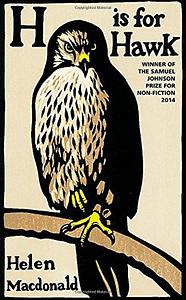You need to sign in or sign up before continuing.
Take a photo of a barcode or cover
emotional
reflective
sad
slow-paced
emotional
informative
reflective
sad
slow-paced
Graphic: Animal death
Moderate: Death
Minor: Death of parent
I've never read anything quite like this. I wish I had half of Macdonald's way with animals, and a quarter of her brains.
emotional
reflective
sad
slow-paced
3.5 stars
I expected to connect with this book more, as I consider myself an animal lover and this book is a type of memoir of an animal lover: her experience training her goshawk. I really enjoyed many parts of the book; Macdonald truly has an amazing vocabulary for describing her hawk and her experiences and emotions as she trains her (the hawk). However, I think the book felt a little too academic for me at times; it made me feel distanced from the author when I wanted her storytelling to draw me in more.
I expected to connect with this book more, as I consider myself an animal lover and this book is a type of memoir of an animal lover: her experience training her goshawk. I really enjoyed many parts of the book; Macdonald truly has an amazing vocabulary for describing her hawk and her experiences and emotions as she trains her (the hawk). However, I think the book felt a little too academic for me at times; it made me feel distanced from the author when I wanted her storytelling to draw me in more.
Esta es una novela sobre cómo domesticar un azor.
Podría calificarlo así y sería cierto; pero, al mismo tiempo, constituiría una mentira. Esta novela contiene varios niveles de lectura y de narrativa. La autora utiliza una tragedia propia y el hecho de que comenzó a domesticar un azor como consecuencia de ella, para hablar de estos animales, la cetrería, nuestra relación con la naturaleza, los traumas del autor T.H. White y el proceso de duelo. Todo ello escrito con una prosa muy bella, de manera que, como todo buen libro, al final nos habla sobre el ser humano; cómo nos enfrentamos al dolor y la pérdida.
Un libro de no ficción magistral que sin duda me tendrá pensando mucho tiempo.
Por último, solo resaltar el trabajo del traductor, Joan Eloi Roca, que creo hace un gran trabajo.
Podría calificarlo así y sería cierto; pero, al mismo tiempo, constituiría una mentira. Esta novela contiene varios niveles de lectura y de narrativa. La autora utiliza una tragedia propia y el hecho de que comenzó a domesticar un azor como consecuencia de ella, para hablar de estos animales, la cetrería, nuestra relación con la naturaleza, los traumas del autor T.H. White y el proceso de duelo. Todo ello escrito con una prosa muy bella, de manera que, como todo buen libro, al final nos habla sobre el ser humano; cómo nos enfrentamos al dolor y la pérdida.
Un libro de no ficción magistral que sin duda me tendrá pensando mucho tiempo.
Por último, solo resaltar el trabajo del traductor, Joan Eloi Roca, que creo hace un gran trabajo.
So well written, interesting, but hard for me to personally relate to.
I liked it. It's very well written, as many other reviewers have noticed. Your mileage will with H IS FOR HAWK will vary based on how much you're willing to put up with a lot of detail about a hobby you'll never participate in (falconry) and a lot of detail about an author you have probably never read (TL White).
But, towards the end, the author explicitly spells out the themes of the book (or the memoir), and this kind of robs the reader of their own discovery of it. Perhaps that's a good thing? The author lays out their own epiphany, and if you, the reader, have already gotten there, it feels a little obvious. But why am I complaining? It's good account of grief, but I can certainly see why the literary community championed this.
But, towards the end, the author explicitly spells out the themes of the book (or the memoir), and this kind of robs the reader of their own discovery of it. Perhaps that's a good thing? The author lays out their own epiphany, and if you, the reader, have already gotten there, it feels a little obvious. But why am I complaining? It's good account of grief, but I can certainly see why the literary community championed this.
early on in h is for hawk helen macdonald writes about how she inherited a penchant for watching from her father, looking at the world from afar to try and understand it, to inhabit it, to distance oneself from it, to escape from something else.
in many ways this book feels like one prolonged act of critical watching—a wandering, probing gaze that sweeps across macdonald’s own life, her grief, across her intimate process of training her hawk, across the archive and imagined life of t.h. white, the modern author of arthurian legend and someone who documented a similarly transformative process of hawking in a novel which macdonald first encounters in her youth. This book is her response aimed back in time to White and his goshawk; partly a memoir, partly a piece of nature writing on hawking, partly a biography, partly a historical essay, macdonald unravels and unpacks the threads of myth and history that connect her and white and their relationship to the wilderness and hawks, how all of it is intertwined in an english history of colonisation, war, and the shaping violences of gender and race. It’s at times fragmented, erratic in its focus, and yet it’s that effort to weave together all these disparately observed things that most movingly captures the shape of macdonald’s grief. she begins the book looking for an escape in all these things—in her hawk, in the life of t.h. white—but finally what she arrives back toward in her inhabitance of their difference is herself. when she does, in the ending pages of the book, it’s bittersweet and cathartic.
It’s odd, strange, and uniquely beautiful. If it comes apart slightly at the seams at times, it’s perhaps because of where macdonald stops her wandering—at the fringes of considering her position and perhaps even her complicity, of her class and whiteness, in the same histories that disturb and haunt her, but nonetheless that fraught kind of disturbance is there for the reader to look at critically, laid bare honestly and without any guises.
When I first heard about this book almost ten years ago I was deeply drawn to its premise. When I bought it in a bookstore I found it in the midst of other nature writing titles and manuals about animals. It’s special in a way that I don’t think I’ve found before, in that it manages to feel both personal and academic without one clouding the other. This is the kind of writing that I wish I could make.
in many ways this book feels like one prolonged act of critical watching—a wandering, probing gaze that sweeps across macdonald’s own life, her grief, across her intimate process of training her hawk, across the archive and imagined life of t.h. white, the modern author of arthurian legend and someone who documented a similarly transformative process of hawking in a novel which macdonald first encounters in her youth. This book is her response aimed back in time to White and his goshawk; partly a memoir, partly a piece of nature writing on hawking, partly a biography, partly a historical essay, macdonald unravels and unpacks the threads of myth and history that connect her and white and their relationship to the wilderness and hawks, how all of it is intertwined in an english history of colonisation, war, and the shaping violences of gender and race. It’s at times fragmented, erratic in its focus, and yet it’s that effort to weave together all these disparately observed things that most movingly captures the shape of macdonald’s grief. she begins the book looking for an escape in all these things—in her hawk, in the life of t.h. white—but finally what she arrives back toward in her inhabitance of their difference is herself. when she does, in the ending pages of the book, it’s bittersweet and cathartic.
It’s odd, strange, and uniquely beautiful. If it comes apart slightly at the seams at times, it’s perhaps because of where macdonald stops her wandering—at the fringes of considering her position and perhaps even her complicity, of her class and whiteness, in the same histories that disturb and haunt her, but nonetheless that fraught kind of disturbance is there for the reader to look at critically, laid bare honestly and without any guises.
When I first heard about this book almost ten years ago I was deeply drawn to its premise. When I bought it in a bookstore I found it in the midst of other nature writing titles and manuals about animals. It’s special in a way that I don’t think I’ve found before, in that it manages to feel both personal and academic without one clouding the other. This is the kind of writing that I wish I could make.







